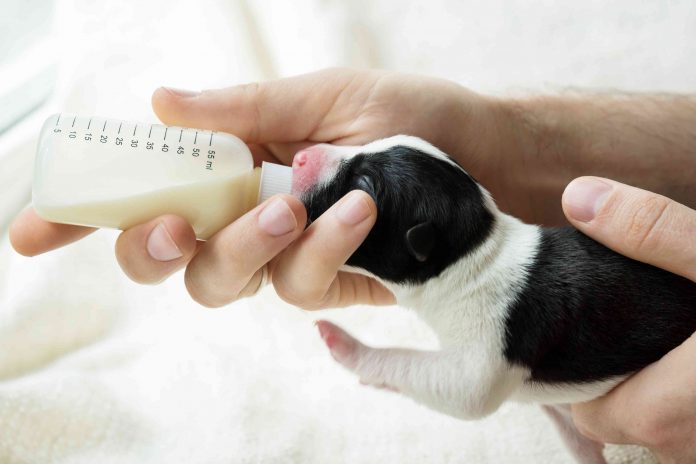During the first few weeks of life, a puppy’s primary activities are feeding, keeping warm and developing social skills. In most cases, humans will simply watch the mother dog provide all necessary care for her puppies. However, if the puppy in your care has been separated from his mother, or if the mother dog has rejected her young or cannot produce enough milk, caring for the pup is up to you.
How Do I Feed a Newborn Puppy?
A mother dog’s milk provides everything the pups need during their first four weeks of life. If you are caring for an orphan or the mother is out of the picture, consult with a veterinarian for guidance on the proper way to bottle-feed newborns, as it is easy to cause harm by doing it incorrectly. The babies will need to be fed a commercial canine milk replacer. Be sure to use one specifically formulated for puppies, as cow’s milk and other milk replacer can cause diarrhea.
Puppies will need bottle or syringe feeding every few hours for several weeks.
Also, make sure orphaned puppies stay warm at this tender age — a well-monitored heating pad or warm water bottle wrapped in a towel will do the trick.
How Often Should a Puppy Eat?
Puppies generally nurse at least every two hours in their first week of life. As they develop and grow, the intervals between feedings increase. At around four weeks of age, puppies can begin to transition from nursing to eating solid food. When making the transition to solid food, a high-quality dry puppy kibble can be soaked with warm water and milk replacer and blended to the consistency of gruel. This can be made available several times a day. Gradually, the amount of milk replacer can be decreased until the puppies are eating dry kibble by about 7 to 8 weeks of age. Consult your veterinarian for the exact amount to feed and for help creating a long-term feeding schedule suited to the puppies’ development needs.





























